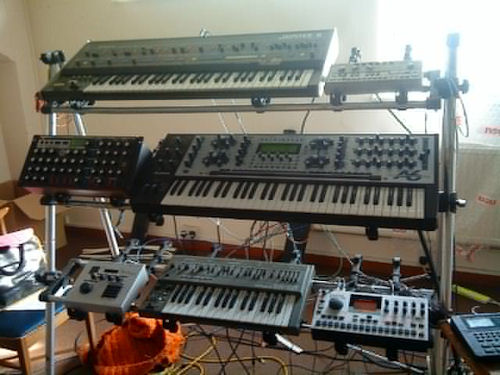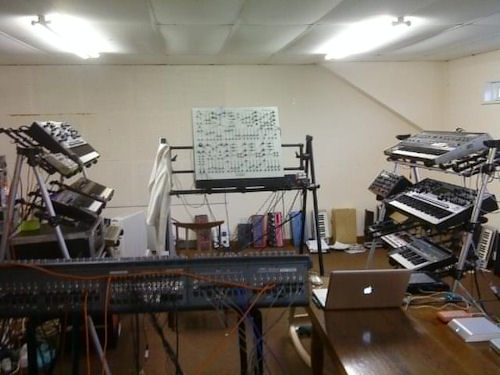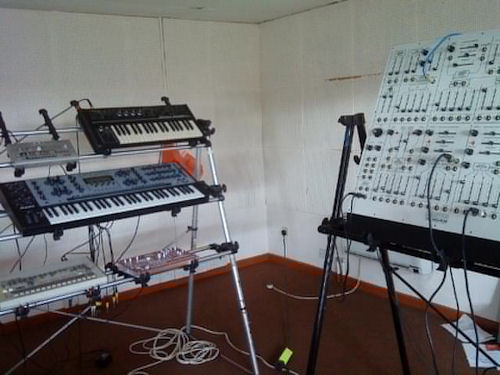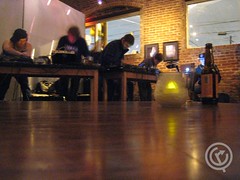How are you utilizing the Hercules RMX into your setup?
I am experimenting with the following. I take my grooveboxes [Korg ESX-1 and EMX-1] and jam for a while until I have some nice patterns with variations going on. Next, I record some medium length sequences (anything from a few bars to a full song) straight into my computer in two layers, usually drums and bassline, and everything else. While recording, I make sure to have intros and outros and some sections that are quite minimal. Next, I take my Hercules RMX and Traktor, and play these recordings back. While playing, I add in a whole load of cue points, and I have the DJ controller set up so I can hop between these cue points, apply effects, loop different parts and do beat juggling tricks etc. I can even have both my Electribes going directly into Traktor through the RMX as it is a two-stereo in/out soundcard, and keep midi sync with Traktor. The RMX is my key from getting out of groovebox jamming mode and into longer arrangements. I'm slowly getting some DJ tricks together for transitioning between parts. It's realtime arrangement while still having that jamming feeling going on and it's showing a lot of promise.
What are some of the advantages to the Hercules RMX and what are your thoughts on it?
I LOVE my Hercules RMX. It's solid and heavy, and rugged enough to take out to milder parties without fears. It is completely usb bus powered, so no extra wall wart needed which is fantastic. If you want to go out to a cafe or friends house its just stuff it and a laptop in the bag (it comes with a bag) and go. Awesome!! It's also a four channel (two stereo pairs) soundcard, so you can cue up stuff in your headphones, and best of all it also has two stereo inputs. Audio quality is pretty good. I'm not an experienced DJ so I can't really compare the feel of the crossfader and pitches with other gear, but for me it works just as I expected and I have very few complaints.
What are some negatives regarding the Hercules RMX and its setup?
Now onto the negatives. The buttons are a tad stiff and travel quite a distance before making contact, something that detracts from the feel, but not terribly so. You might think from the photos that all the buttons light up, but this is not the case, the EQ kill switches for instance are disappointingly without illumination. The jog wheels are great for zipping back and forth in a track, or to scroll up and down in a list of tracks, but if you want to do scratching go get some vinyl. Same probably goes for beatmatching, although this is controversial. I just press Sync and have Traktor beatmatch everything, if you consider that cheating then fine, I'm too busy doing a hundred other things to worry about being a purist. It's digital djing after all, so focus on the cue and loop point juggling tricks rather than beatmatching.
One thing I miss is some way to have an effect send level. The Torq Xponent has four knobs per deck just for effects, which is much nicer, and with the jogwheels at the back (smart for digital dj priorities I think), but the xponent is very plastic and doesnt have the audio inputs, and is way more expensive. There are enough buttons on it to have several Shift modifiers set up, and I've been experimenting with mapping and remapping the EQ knobs and switches to also work as effects sends and levels, still need to find a layout that works best.
It's crashed my macbook a couple of times, but always exactly when I connect it to the usb port. A reboot solves this. Once it's successfully connected it remains working.
In terms of its competition it's kicking major ass. A possible alternative is the Vestax VCI-100 which is very popular, and apparently a bit better for scratching and beatmatching. Not a soundcard though. The Torq Xponent has the smartest controlset of them all IMHO but without audio in it's no good [for LivePA]. I've heard the faders on it are featherlight, your sleeve can accidently knock the pitch way off, and the overall feel is very plasticy. The new Vestax VCI-300 is definitely the sexiest looking of the bunch, with high resolution jog wheels and inbuilt sound, but it's over twice the price and also lacks some dedicated knobs for effects. If you are after sheer bang for the buck, then I don't think there is any competition whatsoever.
I'd like to also mention a bit about Traktor Pro, which has quite a different workflow to it than sequencing in Ableton Live, but it's clear that both programs are slowly converging on a similar solution. Ableton offers a great method for testing out how different loops and clips work together, but personally I just got lost in a mass of clips and find it difficult to sequence my way into a decent performance. Traktor leans more towards an arrangement style, don't forget that it is a dedicated tool designed purely for creating long live sets. There is no reason to stick to playing finished mp3s. It doesn't have the editing features of ableton, not by a long shot, but it's designed to work at a slightly higher level than that. It's awesome for layering, looping and blending loops and minimal tracks. I tend to have two decks with premade tracks playing, and two decks for the electribes (which I usually leave just playing right through). It's possible to record the master output as a wav and load it in a deck without much fuss. Traktor Pro also finally added midi slave functionality, and is far smoother for looping than previous versions. Finally, when you get sick of jamming and making live sets, you can just chill out and DJ some tunes together.
Overall he has a very interesting concept going on. I know more than one LivePA artist who feels like Ableton Live may be overkill for their needs or is instead too cumbersome for the quick edits needed on the spot. This is a great example on the whole though of the convergence of not only the DJ and LivePA worlds, but also how Ableton Live is not the only game in town with regards to software for LivePA.



















